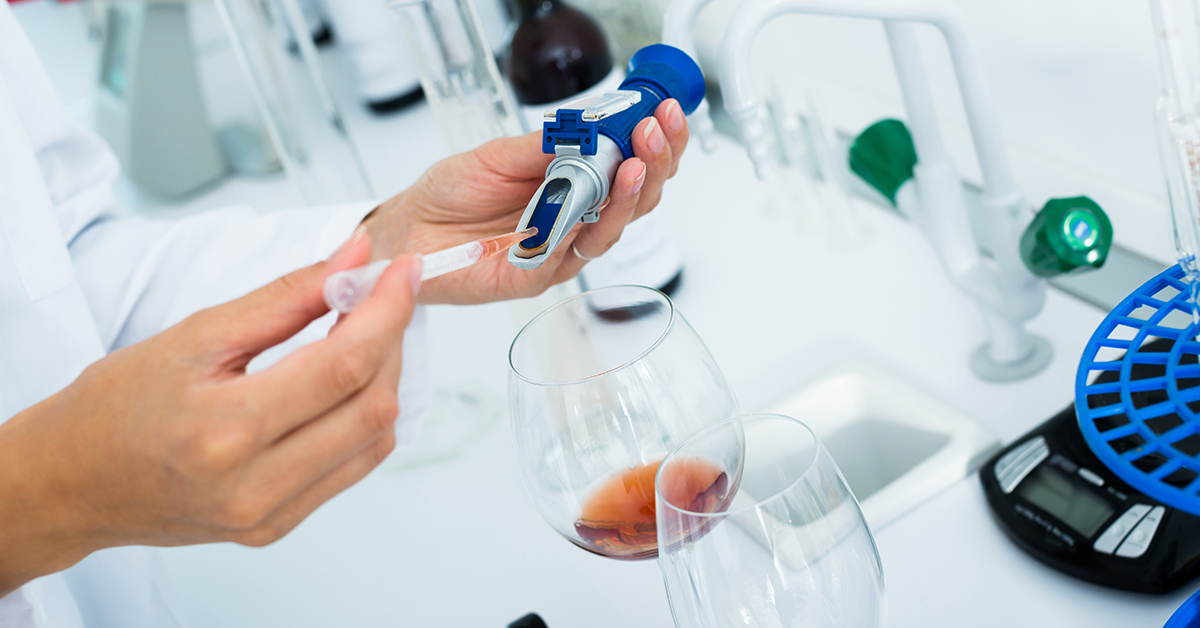
Accelerated shelf-life testing for alcoholic beverages
27 November 2025 | Robert Pride, Senior Analytical Chemist – Wines Specialist
Accelerated shelf-life testing (ASLT) is often applied to determine alcoholic beverage shelf-life to provide a faster time-to-market and earlier identification of issues compared to real-time testing. Here we cover how it is done for alcoholic beverages, why accelerated shelf-life testing matters, the pain points it addresses, when to use ASLT, and what our testing process involves.
[ASLT] is used to predict how long a product will remain stable, safe and high-quality by exposing it to intentionally intensified conditions
What is accelerated shelf-life testing?
Accelerated shelf-life testing (ASLT) is a scientific method used to predict how long a product will remain stable, safe and high-quality by exposing it to intentionally intensified conditions such as elevated temperature, increased humidity, transport stress or heightened light exposure.
These controlled stressors speed up the natural deterioration processes, allowing manufacturers to estimate a product’s real-time shelf-life without waiting months or years.
Why accelerated shelf-life testing matters
Faster time-to-market
- Compresses months or years of aging into days or weeks.
- Speeds up validation of new products and packaging formats, and formulation changes.
- Minimises delays inherent in long, real-time studies.
Early identification of stability issues
- Rapidly reveals potential problems such as microbial spoilage, colour loss, texture or carbonation changes, and chemical breakdown.
- Detects formulation errors and packaging weaknesses before commercial launch.
- Supports confident justification of “best-by” or “use-by” dates.
Product and packaging validation
ASLT accelerates detection of issues including:
- Oxygen ingress;
- Transport stress;
- Light sensitivity (e.g. light strike);
- Chemical interactions between liquid and packaging materials.
This ensures the product and its packaging are robust before scaling to full production.
Quality assurance
- Identifies which environmental conditions accelerate degradation.
- Informs appropriate handling, storage and distribution instructions.
- Reduces the risk of quality failures in-market.
The pain points accelerated shelf-life testing solves
Real-time shelf-life testing presents significant challenges:
- Long testing timelines - often months or years;
- Slow product launches and slower reformulation cycles;
- Reduced agility when ingredients, suppliers or regulations change.
We manage all the operational complexities for you, including:
- Maintaining samples under multiple temperature and time conditions;
- Complete tracking, labelling and documentation;
- Equipment maintenance, cleaning and calibration;
- Standardised, unbiased analytical and organoleptic testing.
When should you use accelerated shelf-life trials?
When producing something new, or making changes to an existing product, it is important to determine the shelf-life and asses the impact of product/packaging/process changes on shelf-life.
For new product development, ASLT is ideal for:
- Wines;
- Spirits;
- Ready-to-drink beverages (RTDs);
- Ciders;
- Cocktails;
- Liqueurs.
When using innovative packaging formats, conducting shelf-life testing is particularly important when launching or switching to:
- Cans;
- Bag-in-box;
- Pouches;
- Pulp-based packaging;
- Alternative bottles;
- Alternative closures.

What our ASLT process involves
Using a proprietary, multi-factor approach, Campden Wine Services simulates real-world challenges such as:
- Transport and handling stress;
- Advanced oxidation;
- Temperature and humidity fluctuations;
- Light exposure.
At each stage, products undergo rigorous sensory (organoleptic) assessment to evaluate early signs of degradation and commercial acceptability.
Our expert sensory panel assesses:
- Colour and appearance;
- Aroma;
- Flavour;
- Mouthfeel;
- Overall quality and any changes in quality.
Evaluations follow the industry-standard WSET systematic approach to tasting used for wines, beers and spirits, and include checks for taints, faults and off-notes.
Assessments take place at 15-day intervals, with each interval representing approximately six months of real-time shelf-life.
In addition to sensory work, we can analyse and trend key quality indicators such as:
- Microbial stability and spoilage risk;
- Potential for refermentation;
- Oxidation levels and antioxidant preservative activity;
- Colour changes (e.g. UV-VIS tri-stimulus testing);
- Carbonation loss;
- Development of taints or faults.
For packaging studies, migration testing - including bisphenols, aluminium and lacquer weight testing - can also be performed.
Benefit from Campden Wine Services’ ASLT
If you are looking to launch a new alcoholic beverage or packaging, or make change(s) to your existing product, get in touch for ASLT support.
We can conduct the ASLT that you need to benefit from faster time-to-market and early identification of issues, ensuring that product and packaging are robust before scaling to full production.
Our ASLT method is validated in-house for alcoholic beverages ranging from 4% to 60% ABV, with ongoing validation for low and no-alcohol products and de-alcoholised wines.
We manage all the operational complexities for you, conduct rigorous sensory testing and analyse key quality indicators, all while ensuring that real-world challenges are simulated.

About Robert Pride
Robert Pride is Senior Analytical Chemist – Wines Specialist and manager of the Campden Wine Services laboratory.
Prior to joining Campden BRI, Robert was Area Manager – Laboratory for Pinnacle Drinks, a part of the Endeavour Drinks Group. Robert completed a Bachelor of Science – Forensic and Analytical chemistry at Flinders University before joining the Australian wine industry, where he has held technical positions for the last 12 years.
Robert has extensive experience managing ISO/IEC 17025 accredited laboratories at Yalumba and Vinpac International and is also a Technical Assessor for Australia’s accreditation body, the National Association of Testing Authorities (NATA). Robert developed extensive knowledge of wine chemistry, microbiology, production, and packaging through his time with Yalumba and Pinnacle Drinks with a focus on continuous improvement, food safety and process driven analysis. Robert is also a former Chairperson and Statistics Secretary of the Interwinery Analysis Group (IWAG), a not-for-profit proficiency testing association and global support network with accreditation to ISO 17043 and over 200 worldwide members.
Robert has recently relocated to the UK where he hopes to help improve the growing wine industry.
How can we help you?
Speak with one of our experts to discuss your accelerated shelf-life testing requirements.
Download our FREE Maximising Shelf-life eBook today!
Explore different strategies to maximise and extend product shelf-life, without compromising safety or quality.







